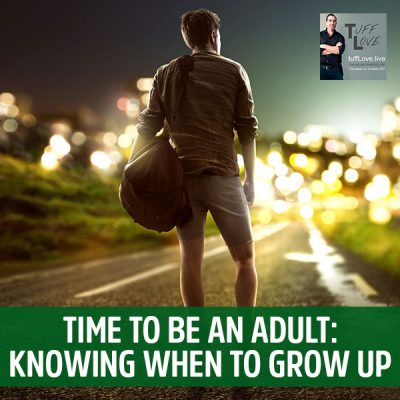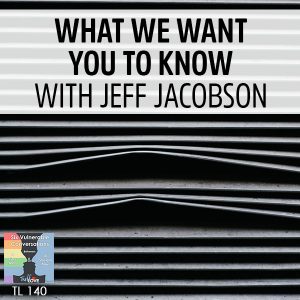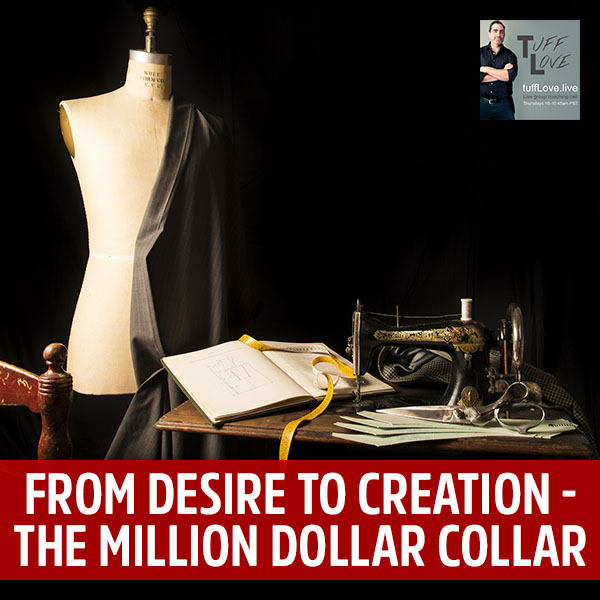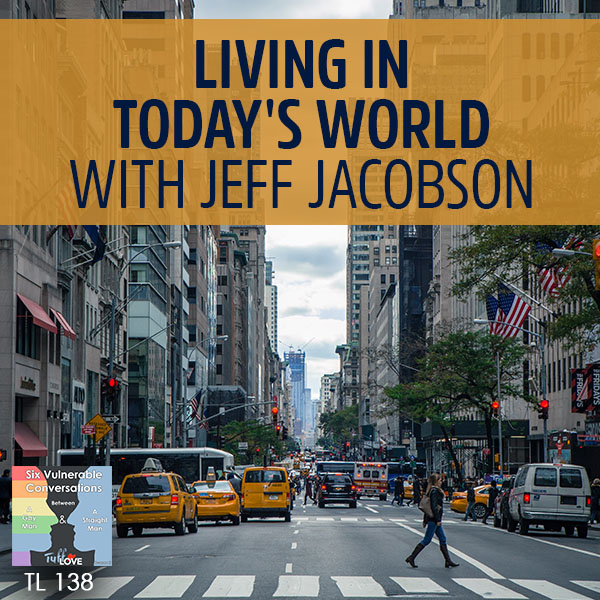
084: On Death
Aug 8, 2017
There are many cultures that believe death is just another part of life; that your spirit leaves your body and goes to another plane of existence. As kids growing up with parents, grandparents and relatives, we get scared of the idea of losing them. They impact our lives because they were a part of it from the very start. But what about people who don’t share your family name? Blood related or not, when a friend dies, a part of you dies. It is an impact that is almost alien and makes you walk out into the rain with no idea where you are going. Learn how the concept of death can become a significant chapter of your life.
084: On Death
This is another episode of Tuff Love on the concept of death. That’s an ominous title. It’s inspired by a very good friend of mine, Jerry Candelaria, suddenly dying. He was 46 years old. He stood up to stretch and he keeled over. It’s had a marked impact on me on how to live. When someone dies, there’s sadness. It’s easy for him, but it’s hard for us. His death has inspired me to start living even more than I am. David comes on the show, a mutual friend of Jerry’s and mine. I’ve known him for twenty years and we talked about where he’s at and how he wants to start living. He’s got some vulnerable pieces of how his deep feeling of unworthiness is stopping him from having the exact life that he wants.
This is a sensitive show. It’s a show very near and dear to my heart, as all of them are, but this one was impactful and it’s the concept around death. I originally thought about the concept around On Death and Dying, which is an incredible book by my mom’s mentor, Dr. Elisabeth Kübler-Ross, but then I thought this is not about death and dying, this is around death. This is inspired by a very good friend of mine and a very good friend of David’s, who’s going to be our guest, our coachee. When he passed and died about twelve or thirteen days ago, it’s affected me deeply. It’s the effect that has legs. It’s like “I’m done with these feelings.” “Nope. There are more feelings around the corner.” “I’m done with this thought.” “No, there are plenty of thoughts.” As I continued to take steps away from his passing, there are more and more feelings arising. When feelings arise or something happens to my life, it’s my opportunity, it’s my honor to bring them to the show and hopefully to help others feel their feelings, see what’s underneath, and not to avoid topics which affect us deeply.
The show is around the concept of death. This show is focused on two men in my life who have died since I’ve been an adult. I’ve had grandparents pass, I’ve had other people pass, but what it comes down to has been two distinct men who’ve died who affected me. The first one is this guy named Jeff. I met Jeff at my first job back in 1994 when I was a baby out in the world, fresh out of grad school, thinking I was so old yet so young, that cockiness that you have of the youth of thinking you’re this advanced person with so much more to learn. I got this job at this rinky-dink computer shop at South of Market, San Francisco. The year was 1994. This was at the start of the rise of the personal PC. For all you young ones, this is going to be very alien. There was a time where everyone didn’t have a cell phone and didn’t have a personal computer. Back in the day, computers were a lot more expensive.

On Death and Dying: What the Dying Have to Teach Doctors, Nurses, Clergy and Their Own Families
I was working for this computer shop at South of Market and we were building high‑end machines for graphic designers right at the start of when McIntosh was starting to produce this. There was a guy named Jeff that worked there. I walked into the job the first day, a cocky, 24‑year‑old. He was 30 or 31, which seemed ancient to me at the time. He worked there for awhile. He was the hardware guy and I was hired to be the software guy. We became best friends. He was an ex-Navy. He had this smile that hits your eyes, he was Irish. He was the first Irish guy that was so Irish. There was my wife at the time, but he was this Irish guy that I became good friends with. We palled around. We went to lunch every single day. We would badmouth and debase everything we could. He became one of my closest friends.
Then about a year and a half into my job, I left and went to corporate America. When a position opened up, I invited him to come work with the same downtown San Francisco firm I got to work for, Montgomery Securities, and he got a job on the help desk. I was working with the clients and we would see each other, we’d run into each other every once in a while, a friendly, “Rob.” We’d go out to lunch once or twice and it was nice having him in the same building. About a year into his tenure, nine or ten months, he went to a San Francisco 49ers game at Candlestick Park. This was before they built the stadium. They are still at the same stadium. It was a wet San Francisco winter.
For those who don’t know about San Francisco, in the winter, it rains a lot and the ground gets very saturated. To make a very long story short, he went to the football game with four of our coworkers in an open-air jeep, and then after the game, as he was leaving, he was trying to exit the parking lot, the jeep drove over some land that looks solid, wasn’t solid, the jeep rolled over. He was the fifth guy in a jeep that should only hold four people. He got thrown and he had brain damage and ended up in a coma right after the accident. I heard about this a day later and I went to visit him at the hospital and I remember him all wired up. I remember saying to him, “You’re not going to die.” I was friends with his wife. I was friends with his son. I comforted them the best I could and then I went back home.
The next day or the day after that, I got to work. I used to go to work at 6:30 AM and busy, busy, and then I go back to my desk after my seventeenth cup of coffee and my fourteenth emergency of the day. There’s an email from HR saying that Jeff had died during the night. I remember the feeling more than anything. I remember standing up, grabbing my jacket and then going to walk around San Francisco. It was a dreary San Francisco wet day, and I felt the loss of him. I felt that feeling that I was never going to see him again and it was so alien to me. I was probably 26 at the time. It was so alien to me because I’d never experienced someone I truly cared about passing. Some people have great relationships with their grandparents and they die and it’s a significant impact. I wasn’t that person for whatever reason.
This person, Jeffrey, dying was the first time I had to experience a loss like that and it shook me to the core. I went to the funeral. I spoke at the funeral. I looked out at the sea of people and I decided I was going to bring out the best of him. I made them laugh once or twice by teasing him slightly. He had these thin legs that I would tease him about. The point is that he died and life moved on, and I completely forgot about him. That was twenty plus years ago. When you don’t have a lot of reminders of someone, it fades from your memory. A couple days ago, I’m scrolling through my Facebook as I normally do and I started seeing messages that upset me. One guy wrote about some loss and then a couple hours later, there was a message that Jerry had died. You read something like that and it doesn’t make sense at the time. There was a feeling of “What? Is this some prank? Is this some elaborate ruse he’s playing on us or something?” There was this shock of, “How can this be possible?”
When you die, it’s game over for this lifetime. Click To TweetI saw him a couple months ago. We went out to breakfast, we laughed and we joked. He seemed so full of life and he was excited about teaching again. He was excited about living. He was dating a dynamic woman that was pushing all his buttons. He was like a kid. He always was this hedonistic kid. We chatted and we talked about hanging out and he wanted to come to Los Angeles with Joan and we even hinted about teaching together. There are all these things and then a few months later, it’s over. He’s gone. I walked around a little numb. I talked to Morgan about it. She had lost an old friend recently and so we compared notes and we chatted about it and I felt my feelings and I processed it. A week later, I went to a memorial service in San Francisco. I woke up and went to the airport. I flew up and then I spent some time by myself before I went to this memorial service, and I flew home.
In that memorial service of 250 people were people I’d known for twenty years or twenty plus years. I watched the depth of feeling inside all these people, loving him and loving each other through him and then loving themselves because of the impact he had on their lives. Jerry and I were never the closest of friends. I would call him an acquaintance more than a friend, but he was an acquaintance I knew I could count on. He was a guy I knew at any time and anything. If I needed something from Jerry, I could call him or text him. I could say, “I need you,” and he’d be like, “What?” I want to talk about one funny story about him. Jerry purchased something for me and he held it for me. I live in Los Angeles. He lives in San Francisco.
A friend of mine, Kim, was driving from San Francisco to Los Angeles, and I said, “Can you pick up this thing from Jerry?” and she said “Sure.” She arranged time for them to meet and then he blew her off. He blew her off and I was like, “No worries. It’s not that big a deal. It’s fine.” Then I arranged two meetings with Jerry in the next month or so. Two of the times I went to San Francisco to pick up this stuff and he blew me off twice, and I was like, “You fucker.” He was like sleeping or hung over or I don’t know what the fuck he was doing. It was 1 PM, I’m banging on his door, I call him the second time. He woke up and he was like, “Rob, I’m so sorry.” I wrote to him, “I understand and I’m disappointed,” so then he said, “I’ll fix it.”
A day later he’s like, “I’m coming down to deliver this to you in Los Angeles.” What he did is he drove from San Francisco to Los Angeles, six and a half to seven hours with our buddy Krishna, dropped off the thing, had a beer with me, sat in my living room, we talked for 45 minutes to an hour. Then he got back in the car and they went to lunch and drove back to San Francisco. The man drove fourteen hours in one day because it was important to him that I felt good about our friendship. It was important to him that he kept his integrity. I’ll never forget that. I’ll never forget that feeling when he showed up. He showed up at my doorstep and handed me the thing that he bought for me. That is just special. You don’t see that very often.
There are other people who have died. My mentor, Ray, died, and then a friend of mine, Benjamin died. They’ve had impact but nothing like these two guys have kept on going. I want to talk about what I feel around the concept of death. The first thing is death is much easier for the person dying, I assume. I don’t know. I’ve never died. It’s easier for the person dying than it is for the people they leave behind. The impact I saw at that memorial service, the posts on this special group they created called “Loving Jerry,” everything has been so obvious to me that the people living are dying and living at the same time at the loss of their friend and their mentor. This is hundreds and hundreds of people, and there are probably thousands who have posted who are affected, and even people who don’t even know him who were affected by him because his lineage continues on. It’s much easier for the people dying than it is for people staying.
The second thing is when you die, it’s game over for this lifetime. There are lots of viewpoints around future lives and past lives. I’m not quite as much of a believer of past lives. Morgan and I talk about this quite a bit. What do we know? How do you even know you have past lives? The point is this, for me, I have enough to do in this lifetime to worry about past and future lives. I have enough to handle. When you die, it’s game over. All those plans and all those thoughts and all those desires that you think you can do later, you don’t get a chance to do that in this lifetime with the people you’re associated with. Jerry apparently on a Friday, stood up, went to stretch his legs, fell over, and died. Game over. His plans in this lifetime are done. His relating with his woman and his sons, his ex-wife, his community is over in his own person. His effect will stay, but it’s game over.
I don’t say this to be shallow. I want to point out that if you keep delaying what you want to do in this life, you never know if you’re going to stand up and something’s going to happen to your body. We all think we’re all invincible. We all think that we’ve got plenty of time. For some of us, we do and for others, like my friend Jeff who went to a football game and never came back, like my friend Jerry who stood up and never came back, you might not. All these excuses that we say mostly to ourselves, but also to our loved ones, our teachers, to our parents, “I can’t do it because X, Y, and Z,” you might want to look at the effect of saying, “I can’t do it,” because it could be that you can’t do it because your dead.
Today is the first day of the rest of your life. I hate that statement, but it’s true. It’s like this is it, in present time, and all these little things that we say to ourselves, we can’t have it. I would look at that feeling. The third thing is when you are out of alignment with someone else and you die, you run out of time to fix that alignment. For some people in my life, I can name three or four, and probably some of you can probably come up with those names in your head, who are close to me and other people who listen to the show can probably figure out who have betrayed me, those people are out of alignment with me and I feel depth of hatred towards them. It’s amazing. Hatred is pleasurable to be honest. It feels fun to hate the villains in your life, the protagonists, the enemies, the Moriarty’s to your Sherlock Holmes. It feels good to hate them.

On Death: It’s much easier for the people dying than it is for people staying.
I was about them and out of alignment with them and I was like, “If I died, I would never be able to say the things that I truly wanted to say to them,” and I was like, “What am I going to do about that? What do I want to do about those people I’m out of alignment?” What do you want to do with the arguments you have with people you’re disconnected to? What do you want to say to your parents? Mathematically, your parents are closer to passing on, whatever words you want to use. They are closer to not being able to communicate with you in this world than you think, so are there things you want to tell your parents? Have you rung the depth of your communications? Someday you might get a phone call that they are no longer available to take your phone call.
Look at the list of people that you’re disconnected from and then start to think, “Is the disconnection worth it? Is it worth it to live in that out of alignment experience you have with these people, and what’s the cost if you went?” I want to do a lot of things in this world before I go. I don’t want to be the guy, 85 or 90 years old, or 100, or whenever Morgan let’s me go basically, I don’t want to be that guy that’s typing some great Facebook messages and I croak, or writing some great blog or taking some video or having some hot sex with Morgan. It’s like, “I want to die in the saddle. I want to die in that static state of living,” because the thing about people dying is it reminds us it’s time to start living.
The Shawshank Redemption is one of my favorite movies I’m a little obsessed with. It’s like get busy living or get busy dying, or some form of that. I don’t know the exact quote and I should look it up, but the point is you’ve got a choice. For a lot of us, we call ourselves that we’re living but we’re not living. We’re not truly living. If we are living, we’re living someone else’s version of life. Are you truly living your version of life? Most of us aren’t. I wasn’t for five years. I was living someone else’s version. If we go back in time, I was living in my dad’s version of how I should live. For the first time in my life at 44 to 47 years old, for the last three years, I’m truly living my version of life, and so I’m grateful for Jeff. I’m grateful for Jerry. They remind me that it’s time to get busy living because I never know when that last breath is going to occur.
The last thing I want to say before we bring David online is that we all have plenty of excuses and they’re legally sound. They will hold up in a court of law. They will hold up in an argument you have with your partner for the reasons that you can’t do what you want to do, but to me it’s bullshit. If you truly want something, if you truly want to achieve something, if you truly want to change your life, you can. It might not be the thing that you exactly want but at least it will put you in the direction of where you want to go. Steve posted the actual quote from Shawshank Redemption. It says, “I guess it comes down to a simple choice, really. Get busy living or get busy dying,” and with that I will end this rant. I’d rather die having sex with Morgan than the Facebook post, but I don’t know how Morgan feels about that, so we’ll do a show on how do you want a die.
Live Coaching
David, how are you?
Hi Rob.
Thank you so much for being on the show with me.
Thanks for having me and thanks for already pissing me off.
How am I pissing you off?
I’m on camera and I’m feeling a lot of emotion, feeling confronted. I was having a pretty cush morning until you came along.
I’ve been writing about this a little bit. I published an article about this. Men don’t give permission for their emotions. Men are not lauded or rewarded for being human, so I want to do it for you, and for other men. Thank you. Thank you for, one, being on camera, and two, for feeling emotions, and then three, for admitting that you’re feeling emotions. That’s unusual. How can I help you? How can we make this twenty minutes optimal for you?
I didn’t know what to expect. I’m struck by urgency as it relates to timescale. You finally started living life on your terms versus on somebody else’s terms. When you were talking, I felt like I was walking and hit a sliding glass door, and stopped right there. I thought everything I saw was clear in front of me and then there was a huge stop. That’s where I am. It’s in this place of my mind in conflict with my heart around how does one define life on one’s own terms inside of an enduring struggle, for instance in relationship. I’ve been in the presence of tremendous compromise in relationship, but thinking that life is on my terms because I’m persevering even though there’s been great discontent, for instance.
You start living life on your terms versus on somebody else’s terms. Click To TweetWhat you’re talking about is a very common thing. We accept good. It’s good enough. Good is the enemy of great. We accept. We persevere. Persevere to me is like you’re playing crash, you’re starving and you have to hike down the mountain, that’s persevering or compromise, but this is where a lot of people live because they, one, don’t know that they’re worthy of having the life they want to have it, and two, don’t have the skills to move from where they are to where they want to get to. Do you think you’re truly worthy to have the life that you want?
I’ve got three answers. Intellectually, I am unquestionable. Do I feel it? I do feel worthy of that when I drop in, it’s undeniable like completely clear, and below that is my actual behaviors that are driven by the most pernicious unworthiness and it’s a huge lifelong struggle based on childhood trauma. I’ve examined it with therapists and professionals, in my own work, shamanic work, and yet it persists. I don’t know how to reconcile those three actualities.
There’re many theories around that. There’re many theories of the cortex and the heart and the soul matching up, etc. I don’t want to spend too much time on the theory, but you’ve identified that piece and that unworthiness, as Morgan likes to educate me, could be yours. It could also be your ancestors’, it could be your parents’. It could be you taking on the energetic karma of others. You, David, by yourself, good soul, good person, good man, loving husband, etc., and you could be carrying the baggage of others that has you hearing the messages, the messages that don’t even belong to you, that I’m not worthy. Your crime, let’s just call it a crime, is that you believe them.
What do we do with that? What are the steps to handle it? The first thing is acknowledging it. To any problem, to any challenge, to anything, to any adventures, the first step is to say, “This is the scope of it. This is the thing to focus on.” We could talk a lot about behaviors, we could talk about actions, but it comes down to that core belief that are you worthy to have the life you want? I didn’t believe I did until about three years ago. I served, I turned my life over to a woman and to a cause, and I thought my desires were secondary, tertiary, not even on the list, and I lived that way for ten years or twelve years, and then one day I woke up and said, “No, I’m not going to spend the rest of my life like that.” I walked away from a great purpose-driven, sex‑driven, ulcer-creating life. In three years, I’ve turned my life around 180 degrees to swimming in a pool in the valley on a hot summer day as my dogs look at me like seals and my fiancée loves me with her eyes, and I’m like, “Holy shit. This is such a different existence.”
I’ll call it stepping into the abyss, like there is something that at some point I’m interested in. You said you suddenly woke up and you made the change. For me, it’s stepping off this edge into this mystery. We’ve identified it as like the mystery. Am I going to embrace it? How did you make that move? What was it like?
The first was I thought to myself, “Even if I lose everything, even if I lose my name, my prestige, my reputation, all the money, it’s got to be better than this feeling of being a slave of my own creation, a victim of my own creation.” I built an international eight-figure business. I was the head of a community. I was a leader of men and women. I had a lot of attention sexually. It’s still this feeling of being a slave to my creation wasn’t worth it. I didn’t tell anyone, not a soul, and I spent a year plotting and planning the changes I would make in my life, one to ensure that my creation was taken care of, and two, I’d be taken care of. I plotted it for a year deliberately and when circumstances arose, I was able to pull the pin. If you stepped into the abyss, what are you afraid of losing?
It’s like fade to black because I can’t be dishonest. I’m afraid of losing my sanity.
I didn’t quite believe that.
When I take it all the way out, in breakdown, my unworthy victim can be so strong that it can create some very irrational behaviors. When I take that all the way to the line, I go like, “If I am somehow not held at all in that which I know and have worked so hard for, if nothing’s there, I might spin uncontrollably and then tonight, I’m going to end up on the street.”

On Death: My unworthy victim can be so strong that it can create some very irrational behaviors.
That’s a common fear, homelessness or ending up on the street, which on some level is being alone and abandoned. We’re much more scared of living in an apartment by ourselves with no one to talk to. Living on the street would suck, but I’m saying it’s the energetic, not being connected to another human being. I had to feel that feeling of never being connected again. I had to risk it to be in that part at the same time, having a 100% faith in my own ability to create, because over here, I have no doubt that you’ll never end up insane.
You might end up sad, you might end up lonely, you might end up depressed. I’m not saying you’re not going to. It’s all bells and whistles and unicorns and rainbows, but I have absolute faith in your ability to navigate your past and end up sane and happier. You have to look at the fear of what’s stopping you from stepping into that abyss because the fear is a thing that’s controlling you and you have to identify the fear and then morph that into desire.
It’s helpful to hear your reframe. If I take it all the way to the end of the scale, I’d be on the street because that’s my mind going, “I can get some victim props here. I might even get some sympathy if I even paint a dramatic picture like that. I feel you’re skillfully reframing that. It’s bringing it back a little closer to maybe it’s an impartment. I also am aware of when you made your step off the edge, you portrayed it as you had a plan. It took a year or whatever it was, but you believed in yourself in that plan, and I’ve got amazing talent and skills and a network and I do great work in the world and all those things are true, but that little unworthy voice wants to go dramatic, and that’s the point that I’d like an insight about.
That dramatic voice is your little internal voice saying, “You won’t pay attention to me,” or, “This is not what I want.” For my story, I dedicated three years to exit. When I made that choice and after the next couple of weeks and I was thinking about it, I was eventually going to tell Nicole I wanted to go and I said to her, “I’ll stay until my 47th birthday,” or something like that. I had a plan and I said, “I’m willing to stay here until you feel comfortable with me going. The systems are set up, the people are okay.” That year, I did everything I could to advance my plan of having everything helped to the point where Nicole knew I was unhappy, she graciously said, “If you want to go, you don’t have to do the extra year or two, you can go,” and I said, “Thank you.”
We had an amicable deal, I split, and then I restarted my life. That’s what I’m saying. I’m not saying or recommending ever, unless you’re in a dangerous situation or toxic situation, to bail immediately and you don’t have to do this in secret. I did it for whatever reasons I did. I can say you can say to your partner, you can say this to your family, you can say this to your friends, “I want to make a change. Here’s why I want to get to. Let’s do this collaboratively. Let’s ensure that we’re in sync,” and then find that worthy muscle to say, “Let’s start tomorrow to figure out the future that has me be a happy, fulfilled man.” It’s possible. I’m not saying it’s easy, but it’s possible.
Thank you for that.
What’s one thing you want that you don’t have right now? It could be something simple or it could be something intense. It’s your choice.
I want to have a period of respite in my home life so that I can apply all this energy to building more clients in my professional life.
What does that mean, respite?
Having things the way they should be, which I keep confronting as not only impossible but not realistic.
That’s your unworthy voice, saying it’s not possible, it’s not realistic. Stick to that brain you talked about, that personality that says anything’s possible and I’m worthy. What does he say or she say or it say?
As soon as I am fully recognized for all the parts that I truly am, then the life of my dreams is going to come true. It’s a little victimy because I go like, “I’m not being recognized,” and I forget that.
As soon as I am fully recognized for all the parts that I truly am, then the life of my dreams is going to come true. Click To TweetYou need to recognize yourself. It’s an inside game. We are addicted to external validation. God bless social media to feed our addiction like some really fine heroine, but it’s got to start with you. I posted an article that I love and I’m praying it goes viral to get me more people for my mailing lists. When I posted it, I was like, “I love this article, I love this message, and it goes where it goes. Let the chips fall where they may.” If you’re looking for external validation, odds of it coming exactly the way you want it is slim and the odds of you receiving it, when it does come, is even slimmer because of that unworthy muscle.
Thank you. That piece was super pertinent and lands in a good place.
I’m glad. When the bell rings in my head, now it’s time to listen to the bell, so I’m going to leave it there with you. I’ve known you for probably as long as Jerry. We’ve been friends. I remember Burning Man 2003. The point is that I know you and you are a good man. You deserve everything you want and you can, in collaboration with Cass, create that. It’s possible.
Thank you. Thanks for this time and thank you for presencing Jerry in the community in such a powerful and real way. You make a difference every day, I know that, and you made a big difference for me, so thank you.
It’s my pleasure. Thanks for being on the show.
My love, Morgan, writes there’s a tapping meridian point that helps reprogram limiting belief systems. It is located at the knuckle where the pinky finger and hand connect. You tap to a waltz rhythm and speak out loud the new belief. Do this four per day for six weeks. I don’t believe in this stuff, but Morgan is making me a believer, so let’s give credit where credit’s due. If you want to find more about Morgan, MorganMellas.com. The point is that it’s true. We have these limiting beliefs and they’re arbitrary. It’s an arbitrary belief that you can put stock into or not.
It’s your choice, like choosing to live or choosing to die. You have a choice and that choice can change, and for me, every day I wake up, I’m like, “I’m going to do something super bad-ass, cool,” and that could be as simple as making my stepdaughter smile to writing a great blog to coaching someone pass their limiting beliefs, etc. Whatever your flavor is, you have the choice to go and change it. My hope for you and my love for you is you’ll do it.
A very interesting flavor to the show. I’m very grateful for David for coming on the show. I’m very grateful for my people who come on and cheer me on with their eyes, their smiles, and their claps, and provide quotes when I don’t know the exact quotes. I’m grateful for that and I’m grateful for this life. I’m grateful to Jerry for what he did to me and I’m grateful for Jeff for being my first real adult male friend. I’m grateful to you for all you’ve done to me. Go forth, live life, stop dying.
Nancy Levin is my guest star next week. She’s an amazing writer and an old friend. She’s connected to Hay House and writes incredible poetry. I’m looking forward to her and she has a fascinating story she’s going to share with us. That’s next week on Tuff Love. Until then, go forth, get some nookie, have some fun. I love you. Take care. Thank you so much for joining us, David. Thank you so much for being vulnerable and real. I’m grateful to all my listeners who inspire me to do this, to feel my feelings, to notice what’s happening, to write it down, to elucidate it, to speak it, because the more I speak it, the more I feel it.
For more shows, please visit TuffLove.Live. We would love you to subscribe to us on iTunes. You can write a review if that’s what you fancy. It helps us, so please write a review, and as always, if you like to join my mailing list, that’s a big boon because the book proposal is around the corner and I could use your help. Go forth. Thanks so much. I love you. Take care.
Resources mentioned:
Podcast: Play in new window | Download







